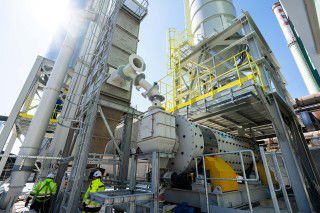The Department for Business, Energy and Industrial Strategy (BEIS) has awarded the Mineral Products Association (MPA) GBP6.02m (EUR7.24m) for ground-breaking demonstrations of hydrogen and plasma technology to reduce CO2 from cement and lime production.
The cement trials will take place at sites operated by Tarmac and Hanson Cement in the UK. The cement production trial comprises two demonstrations, one of electrical plasma energy and biomass fuel and the other of hydrogen and biomass energy.
Both projects will see their results shared to their wider industries and supply chains, to spread the benefit to UK and global industry, and maximise the environmental benefit of the technology. The MPA projects are forecast to be completed by the end of March 2021.
Nigel Jackson, MPA chief executive, commented: "This important award demonstrates MPA members' commitment to collaborative research and innovation to meet the industry's climate change objectives."
Mike Eberlin, Managing Director of Tarmac's Cement & Lime business said: "Securing this funding is an extremely positive step for our industry as we support the UK's ambition of achieving net-zero carbon emissions by 2050.
"Collaborative working and embracing innovative technologies are key in our collective efforts to create a lower carbon, resilient built environment and we're proud to be involved in such an important project which will help inform industry and Government strategic plans on decarbonisation."
Hanson UK CEO Simon Willis added: "Cutting carbon emissions is a key priority for us at Hanson and our parent company Heidelberg Cement Group is the first in the industry to commit to producing carbon-neutral concrete by 2050 at the latest.
"These BEIS-funded research projects could represent a significant step change in supporting the UK government's sustainable development goals as it responds to climate change."
The demonstration projects follow a BEIS-funded feasibility study in 2019 which found that a combination of 70 per cent biomass, 20 per cnet hydrogen and 10 per cnet plasma energy could be used to eliminate fossil fuel CO2 emissions from cement manufacturing.
